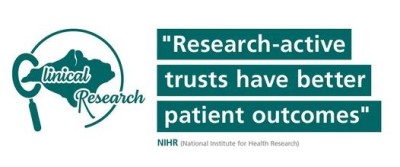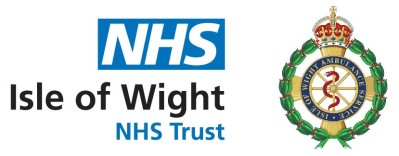
We are committed to making a contribution to wider health improvement through active participation in clinical research.
By staying abreast of the latest possible treatment possibilities, our staff’s active participation in research leads to successful patient outcomes.
Research information for patients
What is clinical research?
Clinical Research is a way for health professionals to gather evidence to improve treatments and care for patients in the NHS. Doctors use clinical research studies to compare current treatments with potentially better ones, so that we can keep improving the care we offer NHS patients.
Clinical research also helps to prevent disease, or delay its progression, providing wider benefits to the population as a whole and understanding patients’ perspective of their quality of life is integral to trial designs.
How is the quality of research ensured?
The Department of Health has established a framework for the governance of research to ensure that the public can have confidence in, and benefit from, quality research in health and social care. Research is conducted in line with the Saving and Improving Lives policy. Our Research Department is responsible for ensuring that any research undertaken through our organisation is conducted to these standards. All projects are reviewed thoroughly to ensure that they are appropriate for our organisation. Permission is then granted for research involving our patients, service users, carers or staff, before the research starts.
Participating in research studies
It is possible that you may be asked to take part in a research study. There are many varied types of research involvement; you may only be asked to complete a questionnaire, or to have blood tests, or to take medication. Whatever your level of involvement, your participation is always voluntary and you are able to withdraw from a research study at any time, without giving a reason, and without it affecting your normal treatment.
Find out more about getting involved with research on the National Institute for Health and Care Research (NIHR)'s website, but please contact us if you are interested in getting involved with research, and we will look at our current studies to check your eligibility.
You can also visit the NIHR’s Be Part of Research website, where you can set up a free account and they will match you to suitable studies and send you information about how to take part.
Current research
We support research across a range of clinical specialities. Throughout 2024-25, our Trust has excelled in recruitment to high-quality studies, reaching 570 participants, a significant achievement for a Trust of our size and helping us to return to pre-pandemic recruitment levels. Our diverse workforce, including doctors, nurses, midwives and allied health professionals (AHPs), continues to strengthen our research portfolio.
The specialties involved with these trials include: cancer, emergency care, ophthalmology, *paramedic medicine, meds for children, respiratory, surgery, maternity, hepatology, diabetes, dermatology, dementias and neurodegeneration, health services and delivery research, infection, mental health, frailty, microbiology and primary care.
* Read more about the RAPID2 paramedic medicine study.



